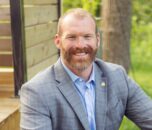JEFFERSON CITY, Mo. – It’s been just a few months since Mike Kehoe was named the state’s lieutenant governor, vacating his seat in the Senate, as well as his role as the majority floor leader.
It was an inevitable outcome that the former senator would no longer hold down that last role, due to term limits, and the race to fill that void has begun.
Two junior Republican senators, still relatively new to the upper chambers, having just finished their second year as state senators, are vying for the role: Sen. Caleb Rowden of Columbia and Sen. Denny Hoskins of Warrensburg.
Both men were elected to the Senate in 2016, and since then, have worked on a number of party initiatives in the upper chamber. Their hope now is to help lead that same party in its daily duties in the Senate.
For Rowden, he said the reason he decided to run was that he felt it was the best way to utilize his skill set to aid the caucus.
“For me, my goal has always been to do whatever I can do to help get our priorities done, to try and find ways to find meaningful compromises,” Rowden said. “And I think the floor leader is well-positioned to do that, to control things that come to the floor, to use things as opportunities to get things done.”
“It’s a very important position,” Hoskins agreed. “That person decides which bills make it to the floor, as well as how much time is spent debating those bills. After serving in leadership in the House, I understand the unique demands of being in leadership, and can work with the incoming freshman to learn the ways of the Senate and help make them as successful as possible.”
The duties of being the majority floor leader are pretty clear: guiding legislation on the floor, pushing the caucus priorities, and helping aid the caucus in fundraising. But the qualities of a good floor leader can be a vast array. Hoskins and Rowden both agreed that it all simply comes down to one thing: trust.
Both agree that the key to building strong working relationships lies in keeping their word and being honest. But they also identified a couple other qualities as important, too, such as being knowledgeable of the issues, being organized, and being able to keep a level head.
Rowden said that ability to move the issues forward is key because there is always issues and disagreements, but to move policies forward, it’s important to build the relationships in order to pass the priorities of all.
Both men agree that the toughest challenge the chamber faces in the next legislative session will be the turnover in the Senate, losing the institutional presence of several senators.
“There’s huge turnover in leadership, and we’re losing a lot of great seniors,” Hoskins said. “A lot of it comes down to working with colleagues and having those relationships. We do have a lot of new faces, Republican and Democrat, coming in, however, I’ve been fortunate enough to work with quite a few of those in the House.”
Rowden said that he didn’t think that someone from their class (Hoskins and Rowden’s 2016 freshman class) would be in a position to do that so early on in their Senate careers, but with the outgoing class being as big as it is, he thinks it pushed everyone up a little quicker.
“It gives us a sort of opportunity to re-imagine what the Senate can look like,” Rowden said. “Yeah, there’s a lot of turnover, and there’s a lot of fresh faces and folks who are figuring out how to get their feet wet, but it also kind of forces us to work together, and provides a challenge, but it can also be an opportunity.”
Both Rowden and Hoskins seem to agree that tort reform, education, and workforce development will continue to be some of the top issues in the coming sessions. They also both noted that there could be legislation that rises from the results of the November general election, whether it be from the Clean Missouri initiative or one of the three medical marijuana proposals.
Members of the GOP Senate caucus have already started to pick sides, though it has been decided that the vote on who will succeed Kehoe in that capacity will not occur until after the November general election. The interesting thing to note here is that with that decision, the incoming senators will have a say in the floor leader race, whereas they would not if the vote came during the special session or prior to the November election.
Both men’s terms have taken place under the guidance of Kehoe and Senate President Pro Tem Ron Richard, and both senators say that watching the work of the majority floor leader and the pro tem was key to learning how to handle such a position, and taught them valuable lessons along the way.
“You can’t view issues in a silo,” Rowden said. “All of these things work together, especially when you get to the end of the session, and you always have to keep the big picture.”
“As majority floor leader, you have to know when to hold them, when to fold them,” he added, saying that the role has to think of the long-term plan.
“One of the things I’ve learned from [Kehoe] is that when things go well, they’re not too high, but when they’re low, it’s not too low,” Hoskins said. “He did a great job of not only working with his fellow Republican senators, but also members of the minority caucus, and he let things play out instead of taking a hard position, and let the senators debate things out on the Senate floor.”
The thing to watch with the younger members moving forward in coming years will be how they take the lessons learned from those departing from the chamber, and how they apply them to continue the traditions of the esteemed Senate. For Hoskins and Rowden, their hope is to preserve the chamber held in such regard by those who went before them and to leave a mark like that of those who walked the halls in days past.
Benjamin Peters was a reporter for The Missouri Times and Missouri Times Magazine and also produced the #MoLeg Podcast. He joined The Missouri Times in 2016 after working as a sports editor and TV news producer in mid-Missouri. Benjamin is a graduate of Missouri State University in Springfield.











